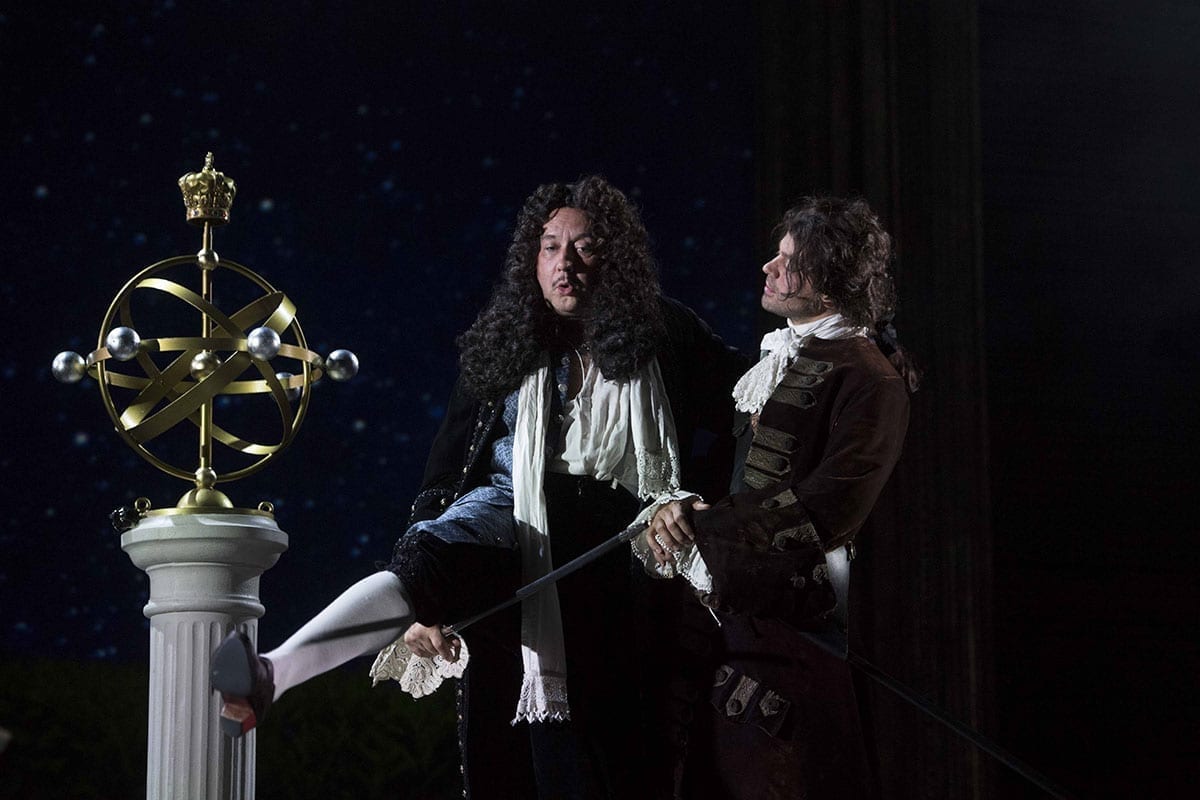‘I do not want you to like me’, Lord Rochester (Dominic Cooper) declares at the beginning of the play, gesturing to the audience with every ounce of the ego and pomp you would expect from the most famous libertine of them all. And yet, despite the delight in hearing such a declaration, perhaps this is the play’s largest problem. It is not so much that we don’t like Rochester – there are countless plays where characters are all thoroughly unlikeable – it’s that we struggle to care about him at all. And given that this is a story about humanity, in all of its excess and its despair, that is not a particularly auspicious start.
This particular production fully embraces the Restoration setting, and the Restoration comedy overtones of the play itself. Before the play starts, bewigged and powdered men peer over the edges of boxes, bawdy orange sellers wander amongst the seats. Almost all of the action takes place on a raised stage, and the meta-theatrical tendencies of the play are emphasised through frequent expositional monologues. Most of these monologues are merely that – exposition – and, by the end, they needed to have become more than that to justify the use of the device any longer. The background freezing of the rest of the characters, as one character steps forward to elaborate, ends up calling to mind a 90s teen TV cliché, rather distracting when one wants to be immersed in the world of the Restoration.
The Libertine is sexually explicit from the start, nimbly weaving between poetic and crude. Literature – particularly Rochester’s own poems, but also work from such notable contemporaries as Dryden – is woven in throughout. In one particularly effective scene, we get a real sense of the literary society of the time, the reading aloud, circulation and rapid response that made it so exciting. Moments like this are perhaps best enjoyed with prior knowledge of the period, with knowledge of the depth behind the moments of political and literary tension.
The lack of depth is where, ultimately, The Libertine falls down. We can forgive our lack of empathy for Rochester, particularly as Cooper’s portrayal grows in strength as the play goes on, earlier hints of desperation and vulnerability coming back with more force. But it is not enough: his lover Elizabeth Barry (the forthright Ophelia Lovibond) pleads with him to show the world the intimate moments of revelation and thought only she gets to see. The world is denied them, and so are we.
The play is never allowed to rest, everything immediately rushed forwards into the territory of quick and easy jokes. The play is undeniably funny, but that is not enough to keep it going. Will Barton plays the comic servant part with aplomb, adopting the cadence of a character from Blackadder, and, at times, the play feels a little like an extension of this. There is nothing wrong in and of itself in adopting a Blackadder-esque tone, but that is not what this play is striving to be. For this particular iteration, playwright Stephen Jeffreys cut 1500 words, but that does not seem to have helped the pacing. The play often drags, and there is not enough of the sense of genuine danger and thrill that permeated the time. There is no satiric bite, and despite the occasional flexing of power from Charles II (a largely-jovial Jasper Britton), he does not carry enough of the sense of danger.
Perhaps this newly-cut version is the reason the plays most beautiful lines are never allowed to just sit with us for a moment. There are moments, single, mid-scene lines, or one of Rochester’s quiet vignettes, that soar. These flashes of poetry avoid having to show the writing process, but the fragments mean the verse can’t flourish. Libertinism was a philosophy, and there is not enough space in this play to ponder. Rochester does not want us to like him, but we should have been allowed to fall in love.

